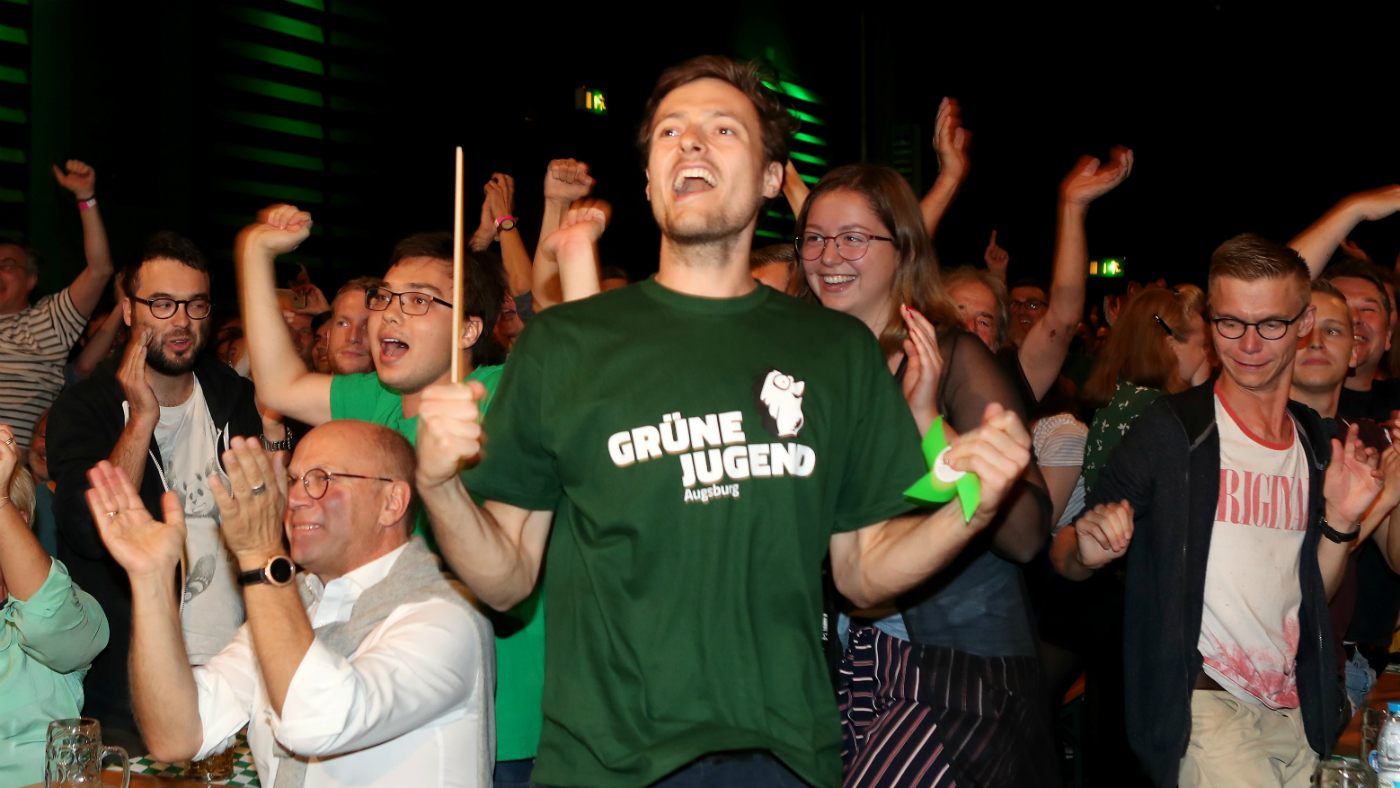What is behind the ‘Green surge’ in Europe?
Movement saw large gains in recent elections in Luxembourg, Belgium and Bavaria

A free daily email with the biggest news stories of the day – and the best features from TheWeek.com
You are now subscribed
Your newsletter sign-up was successful
Elections in three European countries last weekend suggest that both the Continent’s ailing mainstream parties and rising far-right movements are facing a new challenge from left-wing Green parties.
In conservative Bavaria, the Greens doubled their vote in state elections to become the second-largest party. In Luxembourg’s general election, they increased their tally of MPs by 50%, reports news site Delano.
And in local ballots in Belgium, the Green movement, Ecolo-Groen, finished second in Brussels city elections and are poised to become part of a new left-wing ruling coalition, says Politico.
The Week
Escape your echo chamber. Get the facts behind the news, plus analysis from multiple perspectives.

Sign up for The Week's Free Newsletters
From our morning news briefing to a weekly Good News Newsletter, get the best of The Week delivered directly to your inbox.
From our morning news briefing to a weekly Good News Newsletter, get the best of The Week delivered directly to your inbox.
In recent years, “a lot of the focus has been on right-wing, conservative voters deserting traditionally centrist parties for the nationalist fringes”, says CNN. Federal elections in Hungary, Germany, the Netherlands, Italy, Austria and France have seen major political parties surrender votes to far-right contenders.
But as CNN notes, the swing has been “even more dramatic on the Left”. Politico agrees, noting that “socialists lost nearly everywhere this weekend” - with Green parties mopping up many of their votes.
Some analysts believe a desire for clarity is driving voters from both sides of the centre to the Greens.
Reinhard Butikofer, co-chair of the European Green Party - a federation of political parties across Europe - told Euractiv this week that “voters knew what we stood and what we stand for”. He added that “core values like tolerance or openness” have been “left behind by the other parties because of the political pressure coming from the far-right”.
A free daily email with the biggest news stories of the day – and the best features from TheWeek.com
Alexander Clarkson, a lecturer in European studies at King’s College London, agrees with Butikofer’s assessment. “[The Greens] represent a clear place where people can go who are frustrated with the traditional mainstream parties but who don’t like the far-right,” Clarkson told The Guardian.
“They offer a very clear counter-model to the positions and arguments of parties like Germany’s [far-right] AfD,” he continued. “Also they’ve been around for a while now, more than 40 years, and they’ve governed responsibly both locally and regionally.
“They kind of look like the adults in the room.”
But to say that the Greens are simply a blind alternative for disillusioned centrists may not be telling the full story.
According to statistics published by German news network Tagesschau, the three most important issues for voters going into Germany’s recent elections were education, housing and climate change, with almost 50% of respondents claiming they would be voting based on environmental policy. The fourth-most cited issue was migration, at 33%.
What does this mean for the future of the centre? Dutch political scientist Cas Mudde writes that European politics is in the process of “rewiring itself”, making it hard to predict whether the centre-left will recover or the Greens will consolidate their power.
The co-leader of Germany’s green party, Die Grunen, Robert Habeck, told radio station Deutschlandfunk this week that he believed the progress of the movement would be slow but steady.
I think the blow from Bavaria was so strong - an earthquake - that for now nothing will happen,” he said. “People will continue to cling to what power they have. But the ground has opened and those who now take a step will fall into it.”
-
 Political cartoons for February 16
Political cartoons for February 16Cartoons Monday’s political cartoons include President's Day, a valentine from the Epstein files, and more
-
 Regent Hong Kong: a tranquil haven with a prime waterfront spot
Regent Hong Kong: a tranquil haven with a prime waterfront spotThe Week Recommends The trendy hotel recently underwent an extensive two-year revamp
-
 The problem with diagnosing profound autism
The problem with diagnosing profound autismThe Explainer Experts are reconsidering the idea of autism as a spectrum, which could impact diagnoses and policy making for the condition
-
 Epstein files topple law CEO, roil UK government
Epstein files topple law CEO, roil UK governmentSpeed Read Peter Mandelson, Britain’s former ambassador to the US, is caught up in the scandal
-
 Iran and US prepare to meet after skirmishes
Iran and US prepare to meet after skirmishesSpeed Read The incident comes amid heightened tensions in the Middle East
-
 Israel retrieves final hostage’s body from Gaza
Israel retrieves final hostage’s body from GazaSpeed Read The 24-year-old police officer was killed during the initial Hamas attack
-
 China’s Xi targets top general in growing purge
China’s Xi targets top general in growing purgeSpeed Read Zhang Youxia is being investigated over ‘grave violations’ of the law
-
 Panama and Canada are negotiating over a crucial copper mine
Panama and Canada are negotiating over a crucial copper mineIn the Spotlight Panama is set to make a final decision on the mine this summer
-
 Why Greenland’s natural resources are nearly impossible to mine
Why Greenland’s natural resources are nearly impossible to mineThe Explainer The country’s natural landscape makes the task extremely difficult
-
 Iran cuts internet as protests escalate
Iran cuts internet as protests escalateSpeed Reada Government buildings across the country have been set on fire
-
 US nabs ‘shadow’ tanker claimed by Russia
US nabs ‘shadow’ tanker claimed by RussiaSpeed Read The ship was one of two vessels seized by the US military